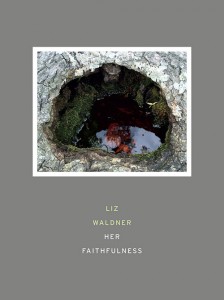Book Review
 Liz Waldner’s masterful new collection of poems, Her Faithfulness, explores the possibilities of a feminist theology, one that embraces both the physical body and the intangible wilds of the imagination. Though tremendously varied in form and approach, ranging from prose poems to lyric fragments, the work in this exciting book is gracefully unified by its commitment to creating a spirituality that allows for joy, pleasure, and imperfection as much as it does reflection. As the book unfolds, Waldner’s formal innovations enact and complicate the philosophical meditations and gorgeously fractured spiritual narratives presented in the content of the work, the end result being a luminous and changeable theology, a vision of heaven that is constantly in flux.
Liz Waldner’s masterful new collection of poems, Her Faithfulness, explores the possibilities of a feminist theology, one that embraces both the physical body and the intangible wilds of the imagination. Though tremendously varied in form and approach, ranging from prose poems to lyric fragments, the work in this exciting book is gracefully unified by its commitment to creating a spirituality that allows for joy, pleasure, and imperfection as much as it does reflection. As the book unfolds, Waldner’s formal innovations enact and complicate the philosophical meditations and gorgeously fractured spiritual narratives presented in the content of the work, the end result being a luminous and changeable theology, a vision of heaven that is constantly in flux.
The poems are especially powerful as a sequence. Often creating startling juxtapositions in theme and counter-theme, form and formlessness, as well as wholeness and incompleteness, the poems in this carefully structured collection strike sparks against one another, suggesting a feminist theology that is multifarious and complex. Waldner writes in “Ex Scriptoria,”
There is, it must be noted, the leaf’s response to water’s touch\
One must admit to bowing with the leaves, being moved as water
moves
Thus the world reads its braille of me
The where I am touched, the mind never sees
Here, Waldner evokes the many types of knowledge of which the human mind is capable, which range from the sensory to the metaphysical. Not only does she level the hierarchies that we tend to impose upon ways of knowing, but she also inverts them, elevating sensory knowledge to the realm of the spiritual and philosophical. For me, this idea comes across most clearly in the final line, which suggests that every epistemology has its limitations. These provocative philosophical observations are juxtaposed with a prose poem, next in the sequence, which begins:
In Center City, Philadelphia, there are strange contraptions fitted
to the strange skinny brick buildings I can see. What can they be?
The senses, too, impose limits on what we can know about the world around us. Waldner constructs hierarchies (as we saw sensory knowledge and the material realm elevated in the prior poem) only to question, problematize, and ultimately dismantle them. Waldner’s feminist theology, then, is an interrogatory endeavor, a series of questions more so than definitive answers. The speakers of Waldner’s poems are compelling in their persistent refining of the initial questions with which the sequence began.
On the level of the individual poem, too, juxtapositions often drive the work. They strike sparks within the reader’s imagination, ultimately inviting them to extend and elaborate upon the luminous topographies within this stunning collection. In many ways, Waldner’s pairings of the high and low, the sacred and the mundane, and the ordinary and the divine prompt the reader to expand what is possible within their thinking of spirituality, reflection, and mindfulness can be. Consider the first poem in the collection, “Due South, for (God)sake,”:
Stones are blue here
blue like lavender is blue
& what it means to me
I do not invite my god to see—
When my god comes to me it is sudden
yet I know she is coming
Here, Waldner portrays her deity as both female and multiple (an idea that subtly evoked by the lack of capitalization). What’s more, she pairs imagery of the natural world (“Stones are blue here…”) with these provocative theological assertions, ultimately showing us that even the most ethereal flights of imagination are grounded in sensory experience. Like other poems in this collection, the senses are elevated, while other hierarchies are dismantled entirely. The title, for instance, portrays this experience of the divine as a descent, rather than an ascent. Thus Waldner calls our attention to the historicity and the construction of the valuations and judgments we tend to impose upon types of knowledge, experience, and insight, particularly as they relate to spirituality and our notions of the divine.
What is perhaps most impressive about the collection is the fact that Waldner rarely philosophizes, instead allows imagery, syntax, and formal variations to do this work instead. For Waldner, each line break, each shift in form and style, presents an opportunity to make compelling claims about the nature of the soul, the divine, and the inherent limitations of our various attempts at knowing. This is a stylistically accomplished, wonderfully ambitious collection, which becomes even more compelling as its incisive and insightful questions change shape before our eyes.
About the Reviewer
Kristina Marie Darling is the author of over twenty books of poetry. Her awards include two Yaddo residencies, a Hawthornden Castle Fellowship, and a Visiting Artist Fellowship from the American Academy in Rome, as well as grants from the Whiting Foundation and Harvard University's Kittredge Fund. Her poems and essays appear in The Gettysburg Review, New American Writing, The Mid-American Review, The Iowa Review, The Columbia Poetry Review, Verse Daily, and elsewhere. She is currently working toward both a Ph.D. in Literature at S.U.N.Y.-Buffalo and an M.F.A. in Poetry at New York University.